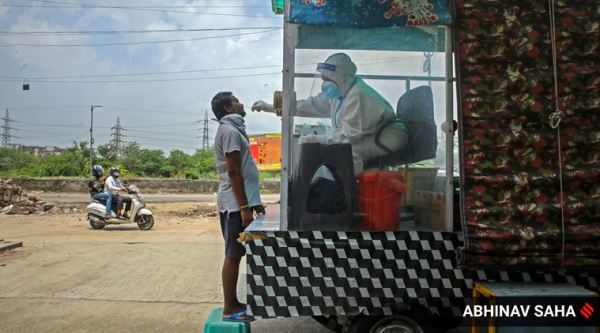 A mobile van takes samples for rapid testing in New Ashok Nagar, New Delhi, Tuesday.
A mobile van takes samples for rapid testing in New Ashok Nagar, New Delhi, Tuesday.
One in every five individuals in a serological survey conducted in Delhi by India’s apex health services and research organisation has shown the presence of antibodies that indicate exposure to the novel coronavirus that causes Covid-19.
The positivity rate of 22.86% for the IgG antibodies also indicates that the remaining over 77% continue to be vulnerable to the virus — and that rigorous measures to enforce containment zones were necessary, the central government said.
The survey was conducted by the National Centre for Disease Control (NCDC) under the Directorate General of Health Services in the Union Ministry of Health and Family Welfare between June 27 and July 10. A total 21,387 samples were randomly collected across the 11 districts of the capital, which were then divided into two groups, of less than 18 years and older. The results of the survey were released on Tuesday.
“The study also indicates that a large number of infected persons remain asymptomatic,” the Health Ministry said in a statement. “Nearly six months into the epidemic, only 22.86% of the people are affected in Delhi, which has several pockets of dense population. This can be attributed to the proactive efforts taken by the Government to prevent the spread of infection…”
A means to assess
A serological survey is done to detect the presence of specific antibodies, and is used to assess the prevalence of a disease in the population. The test indicates past infections (and which triggered an immune response), and is not used to detect active infections.
The decision to carry out a serological survey in Delhi was taken by a high-level committee headed by Dr V K Paul, head of the Health and Nutrition verticals at NITI Aayog, alongwith AIIMS Director Dr Randeep Guleria and NCDC and Delhi government experts.
“Such scientific studies are extremely important and should be performed from time to time to understand the lessons from the past. The numbers collated are from the third week of June when the cases in Delhi were rising exponentially. It is important to note that when the survey was done the city was reporting over 3,000 cases a day. The robust data will be used well in the disease control programme,” Dr Paul told a news conference on Tuesday.
Teams of surveyors collected blood samples from randomly selected individuals after taking their written, informed consent. Their sera were tested for IgG antibodies and infection using Covid Kavach ELISA kits approved by the Indian Council of Medical Research (ICMR).
“In a densely populated city like Delhi, if the prevalance of the disease is 22.86%, it shows the efforts taken by the public and government in preventing the disease. The containment strategies adopted by the Ministry in coordination with NCDC and the Delhi government have helped us to prevent the further spread of the virus. This shows that if scientific principles are followed well then a pandemic can be controlled well. When you work in a systematic way by contact tracing, testing, containment, isolating, quarantine, then we will definitely get the results. This is a collective approach and builds confidence among us about the strategy that we have followed,” Dr Paul said.
ICMR had conducted a pilot serosurvey in April across 83 districts in 21 states. The initial results, which are being peer-reviewed, suggested that the percentage of the general population that could have been infected was 0.73, with urban areas showing a higher prevalence of about 1.09%. ICMR has said it would soon launch a follow-up sero survey across the country.
The Delhi sero-survey showed a Covid-19 prevalence of more than 20 per cent in eight districts. The Central, Northeast, and Shahdara districts showed the highest prevalence of over 27 per cent, indicating that the population in these districts have been exposed to the virus to the largest extent.
“Containment measures need to continue with the same rigour. Non-pharmacological interventions such as physical distancing, use of face mask/cover, hand hygiene, cough etiquette and avoidance of crowded places etc must be followed strictly,” Dr Paul said.